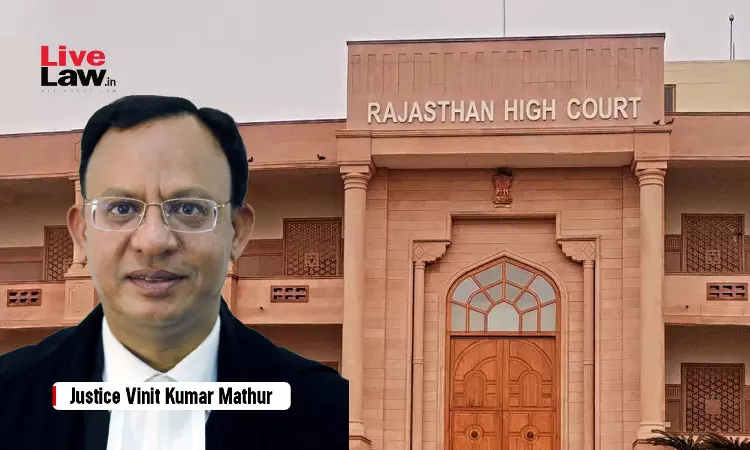- Home
- /
- High Courts
- /
- Rajasthan High Court
- /
- Tenancy Act | Subordinate Court's...
Tenancy Act | Subordinate Court's Ad-Interim Order Not A Decided Case, Revision Plea Not Maintainable Before Revenue Board: Rajasthan HC
Nupur Agrawal
7 March 2025 12:30 PM IST
The Rajasthan High Court has said that under the Rajasthan Tenancy Act, revision petition is not maintainable before the Revenue Board against 'ex parte ad-interim' orders passed by subordinate revenue courts and appellate courts. It thus underscored that Board's revisional power can be exercised only in cases which are "decided" by subordinate revenue court in which no appeal lies either to...
The Rajasthan High Court has said that under the Rajasthan Tenancy Act, revision petition is not maintainable before the Revenue Board against 'ex parte ad-interim' orders passed by subordinate revenue courts and appellate courts.
It thus underscored that Board's revisional power can be exercised only in cases which are "decided" by subordinate revenue court in which no appeal lies either to the Board or to a civil court and where jurisdiction is not properly exercised. It underscored that an ad-interim order cannot be treated as a decided case.
Section 230 of the Act pertains to Subordination of revenue courts. It states that the general superintendence and control over all revenue courts shall be vested in, and all such Courts shall be subordinate to the Revenue Board.
Section 231 states that Board may call for the record of any case decided by any subordinate revenue court in which no appeal lies either to the Board or to a civil court, and if such court appears to have exercised jurisdiction not vested in it by law; or appears to have failed to exercise jurisdiction so vested; or appears to have acted in the exercise of its jurisdiction illegally or with material irregularity. Then the board may pass orders as it thinks fit.
Justice Vinit Kumar Mathur said, “So far as the revisional power of the Board of Revenue provided under Section 230 of the Act is concerned, the same can be exercised in any case “decided” by any subordinate revenue court in which no appeal lies either to the Board or to a civil court and secondly, the power of revision can be exercised on the ground of "jurisdiction" if not properly exercised or exercised with material irregularity. Therefore, in the opinion of this Court, the law mandates the maintainability of the revision petition only in a “decided” case by the subordinate revenue court where no appeal lies and secondly, on the ground of jurisdictional error committed by the lower revenue courts. Further, merely passing of an ad-interim order cannot be said to be a decision on the interim application filed and therefore, the same cannot be treated to come in the category of “a decided case” as per Section 230 of the Act of 1955".
The petitioner was allotted land by the State for establishing Solar Project which was challenged by the private respondent by filing a suit before the Assistant Collector, along with an application seeking interim stay. This application was rejected and was appealed in front of the Revenue Appellate Authority.
Revenue Appellate Authority passed an ex-parte ad-interim injunction asking the petitioner to maintain status quo. This order was challenged by the petitioner before the Board of Revenue by filing a revision petition but the same was dismissed on the grounds of being non-maintainable. Hence, petitioner moved the high court.
The petitioner argued that Board of Revenue has committed an error while rejecting the revision petition. He submitted that the land has been allotted to the petitioner-company for establishing the Solar Plant and, therefore, the private respondent had no authority to assail the validity of the allotment order made in favour of the petitioner. It was submitted Assistant Collector has rightly rejected the application filed by the private respondent seeking interim injunction, however, the Revenue Appellate Authority, without giving an opportunity of hearing to the petitioner, has passed ad-interim order on 26.11.2024.
The State argued that Board of Revenue has rightly rejected the petitioner's revision petition filed by the petitioner as the same is not maintainable against ad-interim order passed by the Revenue Appellate Authority.
The Court perused Section 221 and 230 of the Rajasthan Tenancy Act Act and highlighted that there was no dispute regarding the fact that the Board of Revenue had superintendence and control over all the revenue courts of the State.
However, the revisional power of the Board under Section 230 could be exercised only in “decided” cases by any subordinate revenue court in which no appeal lied either to the Board or the civil court, and secondly the power could be exercised based on “jurisdiction” if not properly exercised.
The court opined the ex-parte ad interim orders are generally passed on the initial date of the case while issuing notices to the other side and after the notice, the other side can appear before the concerned Court and put-forth its defence/submissions.
“Since at the stage of ad-interim order, the application for interim injunction is not decided, therefore, the revision is not maintainable. The simple logic in the considered opinion of this Court is that once the other side appears before the Court, the biparte hearing takes place and then after the opportunity of hearing given to both the sides, ultimately, the Court decides the stay application/application for interim injunction or any other such application. Thus, the revision against ex-parte ad-interim orders is rightly not maintainable under Section 230 of the Act of 1955.”
The Court referred to the full bench decision of the Board of Revenue viz. Jagdish Prasad v Bhopal Ram & Ors. that dealt with similar question and reached the same conclusion.
Accordingly, the petition was dismissed.
Title: N.T.P.C. Renewable Energy v The Board of Revenue & Ors.
Citation: 2025 LiveLaw (Raj) 94



